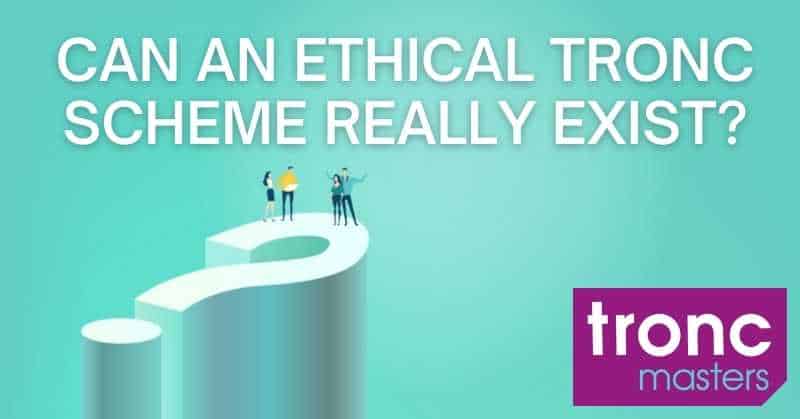
Love them or hate them, tronc schemes are here to stay. But just as the hospitality sector is having to change and adapt, so must tronc schemes.
There is lots of talk at the moment, and a direction of travel from the Government, around ethical, fair, and equitable schemes.
What is an ethical tronc scheme?
Let’s take a step back and look at what is actually happening.
Whether it is a tip, gratuity or service charge, Joe Public’s perception is that any amount given should be going to the people who deliver the experience in hospitality. It is not expected that tips are going to the employer/owners for them to benefit.
Despite most people being horrified at the thought of employees not receiving the full tip they intended for them, the reality is often different, whether as a deliberate decision or poor design.
As we explained in our recent blog “Do you need an independent Troncmaster?” many fair employers following good practice choose to use an independent Troncmaster to ensure their scheme is ethical and transparent.
Unscrupulous employers
Occasionally, unscrupulous employers manipulate the system with charges and deductions from amounts received under the guise of “administration charges”. These are often in excess of the actual costs incurred.
Recent trends as we push toward an increasingly cashless society, and in response to COVID, see a big increase in collection of tips through point of sale credit card machines. So how does the customer know how much of this is going to the staff? And how to employers ensure that moneys landing in their bank accounts are distributed fairly to staff? The days of the tip jar behind the bar or counter are fading fast.
The Good Work Plan released by the Government in December 2018 set out to address this but has yet to be enacted.
Responsible employers, in advance of legislation arriving, are now looking to ensure ethical tronc schemes are created for their employees.
Poorly designed troncs
As the UK opens up again we are also seeing a number of badly designed troncs that do not maximize the discretionary amounts given to employees. Examples include;
- Service charges that are mandatory not discretionary
- All tips banked as company income and subject to VAT
- Owners controlling the distribution and payment of tips failing the qualification for NI relief
The cost of getting it wrong can be complex and significant. Getting a tronc wrong can have an impact on VAT, Corporation Tax, PAYE, and NI with the responsibility for getting it wrong falling to the employer.
What does an ethical tronc scheme look like?
The hallmarks of an ethical tronc scheme include;
- A scheme that is fair and transparent for customers, employees, and employers
- No-one benefiting from the tips other than the employees
- Rules for a tronc should be agreed by its members, not the employer
- Allocations from a tronc are fair and not directed by the employer
- Employers should aim to maximise the amount of money that is distributed to employees
- Only genuine 3rd party costs should be deducted from the scheme
- Troncs should be setup effectively setup to ensure PAYE compliance
- National Insurance reliefs should be maximised
To find out more about how to setup up a tronc scheme for your hospitality business or to speak to someone about reviewing your existing scheme contact us.
